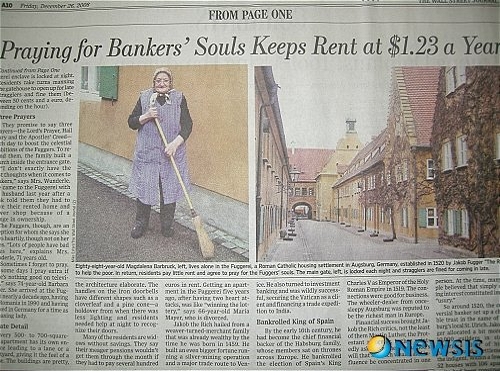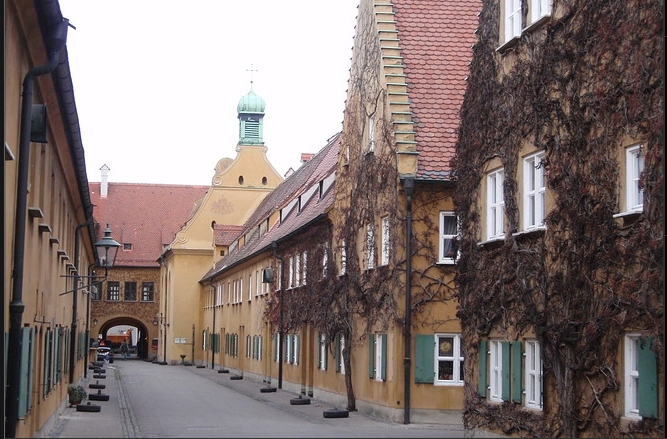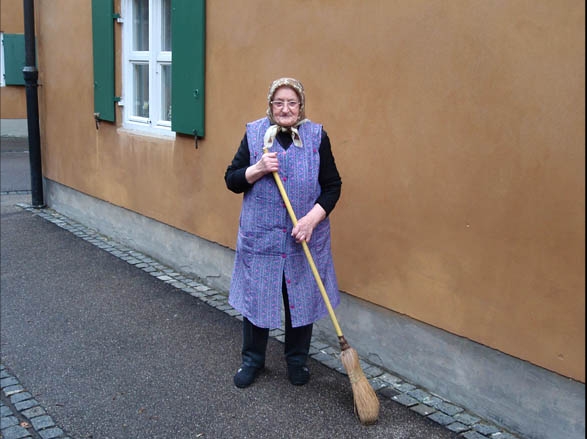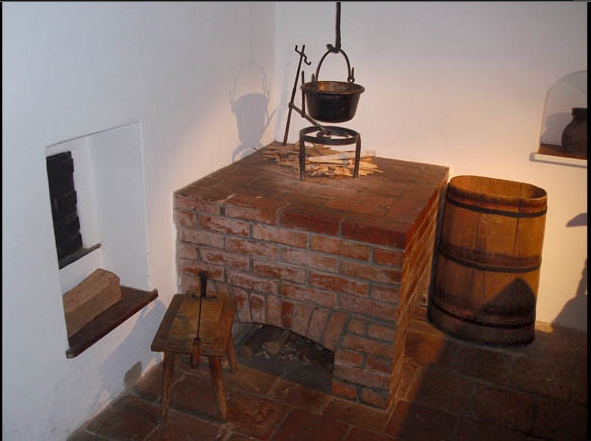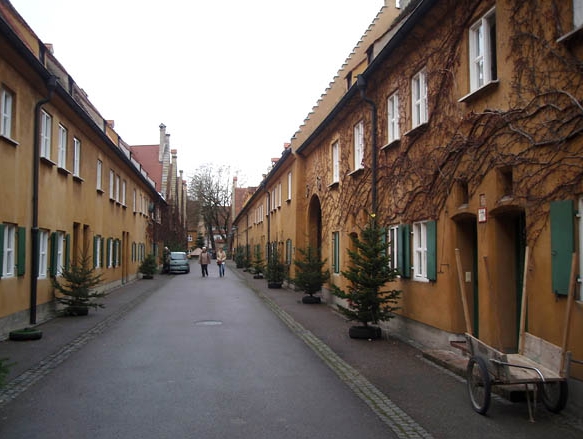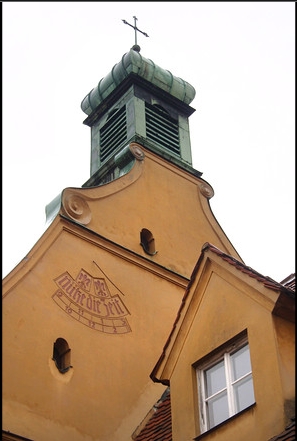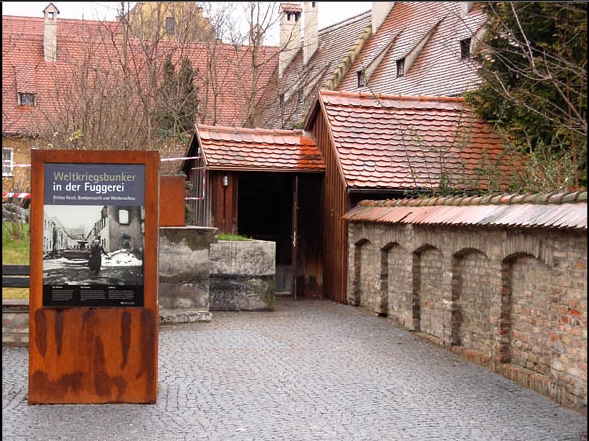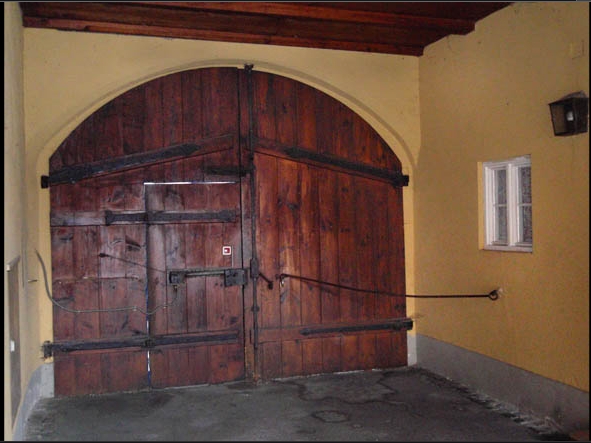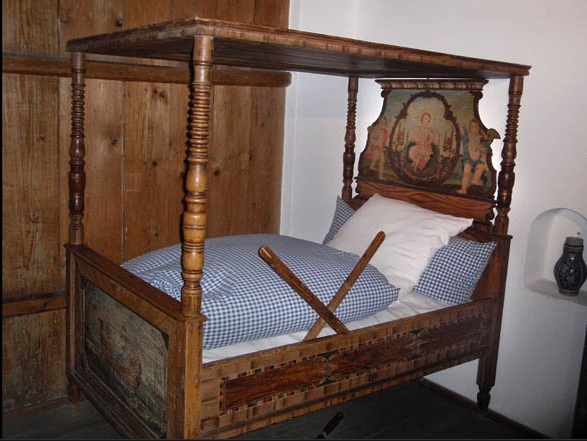17세기 스웨덴의 군대가 이곳을 정복했을 때와 2차 세계대전의 엄청난 폭격으로 건물 대부분이 피해를 입었을 때도 거뜬하였던 푸게레이마을!
우리나라에 오랜된 건물과 오래된 마을들을 떠 올려본다.
유구한 역사성에서 보자면 독일에 못지 않는 5000년 역사 아니 그 이상의 역사가 우리에게 분명히 존재한다.
그럼에도 과연 오늘날 그런 오래 된 건축물이 있어 우리끼리만 말고 세계인들에게 당당하게 내세울 수 있는 것들이 과연 한반도에 얼마나 있는가 하는 물음이 없을 수가 없다.
왜 없겠는가?
역사적으로 따지다면 분명하게 있어야 한다.
우리의 역사가 수많은 피침으로 얼룩진 역사라고 하지만 지금까지 생존한 나라치고 정도에 차이가 있을 뿐 그런 피침을 받지 않았던 나라가 없다.
독일도 순탄치만 않았던 나라이다.
위 독일 마을은 그러한 어려운 환경(스웨덴침략, 1,2차세계대전)에 있었음에도 오늘날까지 500년을 거뜬히 견디어 낸 마을로 존재하고 있는 것이다.
왜인가?
다행스럽게도 천리를 거스리며 강압적이고 강도같은 무리배들에게 역사조작 대상으로 전락한 사실이 없었기 때문이다.
우리가 살고 있는 한반도엔 왜 500년 되는 마을이 없는가?
그래서 그 속에 있을 500년 되는 건물이 왜 존재하지 않는가?
분명히 역사서에는 존재하는데 한반도 땅에는 없다고 하는 사실이 과연 믿어지는가?
역사학자들은 없어진 이유가 하나같이 전쟁으로 인한 파괴이고 화재 즉 소실이다.
임지왜란이 1592년에 발생되어 7년전쟁동안 한반도내 모든 것이 다 파괴 되었다고 하더라도 그 때 이후 건물을 전혀 짓지 않을 수 없는 것이고 건물을 지었다면 일제식민통치시점까지 그리고 일제가 손을 대지 않았다면 최소한 독일마을처럼 500년 건물정도는 존재 할 수 있었다고 보아야 한다.
그러나 없다.
서세들의 배경으로 일제가 근대문명을 앞세워 조선을 쇠락케 하고 그 조선을 이은 대한제국의 간판을 강제적으로 걷어내면서 한반도 전역을 완전히 수중에 넣고 통치 할 때 부터 계획적으로 그들의 음흉한 틀을 만들었을 것이고 그 때 부터 기존 조선과 전혀 또 하나의 식민국가, 신생국가를 입맛에 맞게 마음대로 건설하였던 것이다.
그 당시까지만 하더라도 일제가 허망하게 망할 것이라고 감히 생각조차 했겠는가?
언제까지고 그들이 통치하는 굴레안에 두려는 음모를 한치오차도 없이 정확하게 그리고 치밀하게 전개하였을 것이라고 생각하지 않을 수 없다.
결국 현대 영화제작세트(축소된 역사)장 만들기가 진행 되었다고 해야 할 것이다.
한반도 모든 지역에서 모든 유적과 유물 그리고 건축물들을 가리지 않고 그들이 원하는 세트장으로 만들어버렸던 역사가 바로 과거 일제식민지 역사란 것이다.
오죽했으면 프랑스사진작가가 근래 서울을 보고 500년 역사가 살아있는 도시라고 도저히 믿기지 않는 무계획적이고 마구잡이식 도시라고 혹평까지 하는 것을 TV로 본적이 있다.
우리가 아는 상식에 의한 역사 건축물이라고 하더라도 그들이 측정하는 년도수는 고작 길어야 100년에서 150년 정도의 건물 뿐이니 그런 소리를 들을 만 한 것이다.
도대체 서울뿐만아니라 한반도 어느곳에서도 정말 오래되었다고 내세울 만한 것이 없다.
다시말해 조선을 승계하면서 제칭(황제칭}한 대한제국이 힘없이 일제 아가리속으로 먹혀들때부터 진짜 조선인의 역사, 한민족의 역사는 깡그리 사라지고 없어져 버리고 만것이다.
청소년들이 배우고 있는 현대역사교과서에 한반도 여기는 어느시대 저기는 어느시대라고 하면서 마치 그 때 부터 존재했던 것처럼 유물 고적을 말하고 가르치고 있지만 과연 진실된 역사사실과 일치되는가 하는 문제에서 그 누구도 장담 할 수가 없는 것이다. 그렇기 때문에 잘짜여진 허구를 가르치고 그것을 사실인냥 역사지식이라고 배우고 있는 우리 대한민국청소년들이 불쌍하지 않을 수 없는 것이다.
이러한 사실은 전문가가 아니고 평범한 보통사람이라 할지라도 피침당하는 시대적 상황과 양육강식논리, 지배와 피지배관계를 대입하면 이치적으로도 얼마든지 알 수 있는 문제이고 실존의 역사인 것이다.
그렇지만 어떻하겠는가?
시대적 상황을 안타깝게 생각 할 수밖에 없는 것이고 돌이킬 수 없는 불행이었다고 스스로 자위 할 수밖엔 다른 도리가 없다. 이제부터라도 다시는 그러한 굴욕을 맞이하지 않도록 우리가 스스로 경계하는 것 외 다른 방법이 없다.
오늘 인터넷기사에 있는 독일마을 독일인의 특별한 역사 보존성이 부럽기도 하고 한편으론 부끄럽기도 하다. 언제까지고 허구의 역사를 철석같이 믿고 따를 수밖에 없는 처지...
암담하고 슬프기만 하다.
*******************************************
500년간 월세가 1500원, 독일 마을 화제
[뉴시스] 2008년 12월 27일(토) 오전 03:45
500년간 월세가 단돈 1500원에 불과한 독일의 마을이 화제를 모으고 있다. 월 스트리트 저널(WSJ)은 26일(현지시간) A섹션 1면 기사로 독일 아우스부르크에 있는 푸게레이 마을의 특별한 사연을 보도했다.
WSJ는 “독일 남부에 있는 푸게레이 마을은 1520년 조성된 이래 월 렌트비가 1라인 길더(1,23달러)로 한번도 오르지 않았다”면서 “146명의 마을 주민들은 요즘 500억 달러 폰지사기 등 월가에서 비롯된 경제위기에도 불구하고 매일 금융인들의 영혼을 위해 기도하고 있다”고 전했다.
이 마을은 약 500년전 야콥 푸거라는 부자가 가난한 사람들을 위해 세운 천주교인들의 거주지이자 금융의 중심지였다. 공짜나 다름없는 렌트비를 내는 조건은 한 가지 마을 사람들이 푸거와 그의 후손들을 위해 기도하는 것이다.
월가 금융인들의 원조격인 야콥 푸거는 16세기 전후 바티간 왕국에서 사용하는 동전을 제조하고 향료무역으로 큰돈을 번 엄청난 부자로 사후에 무려 7톤의 금을 남겼을 정도였다. 푸거 가문은 이후 150년 사이에 전쟁 등 외부 요인으로 몰락의 길을 걸었지만 7개의 문이 있고 성벽으로 둘러싸인 그림 같은 푸게레이 마을은 아직도 굳건히 자리를 지키고 있다.
이 마을은 밤이 되면 마치 중세시대처럼 성문을 닫는다. 주민들은 당번을 정해 게이트 하우스를 지키고 늦게 들어오는 이들에게는 50센트 정도의 벌금을 부과한다. 주민들은 매일 야콥 푸거가 하늘에서 평안하도록 주기도문과 사도신경을 외우며 기도한다. 이를 위해 푸거 가문은 성문 입구 안에 교회를 따로 세웠다.
꽃집을 운영했던 리타 분덜레(71) 씨는 남편과 함께 지난해 이 마을에 들어왔다. 그녀는 가게 겸 집에서 살다가 건물 주인이 바뀌었으니 나가라는 은행 요구로 이사를 하게 됐다. 은행에 의해 쫒겨났다가 수백년전 은행가의 은전으로 보금자리를 만든 셈이다. 분덜레 씨는 “솔직히 은행가들을 어떻게 생각해야 할지 모르겠다”고 복잡한 심경을 드러냈다.
바바라 예거(74) 씨는 10년전 이곳에 왔다. 90년 고향 루마니아에서 독일로 이주한 후 세탁일을 해온 그녀는 “가끔 기도하는 걸 까먹기는 하지만 시간이 남으면 TV에서 안 좋은 일을 당하는 사람들을 위해 기도한다”고 말했다.
주민들이 거주하는 집은 아파트 형태로 각각의 공간은 500~700 스퀘어피트(17~22평)로 다소 작지만 별도의 출입구와 안마당이 있어 단독주택의 느낌을 준다. 건물은 고풍스러우면서 예쁘고 문 앞에 달린 벨은 클로버 잎이나 솔방울 모양 등 각각 다른 디자인으로 돼 있어 불빛이 없어도 누구 집인지 구별할 수가 있다.
주민들 대부분은 저축한 것이 없는 과부들이다. 이들의 빈약한 연금으로는 한 달에 몇백 유로나 하는 렌트비를 감당할 수가 없다. 마리아 마이어(66) 씨는 5년 전 두 차례 심장쇼크를 일으킨 후 푸게리 마을에 들어 올 수 있다면서 “마치 복권에 당첨된 것 같았다”고 말했다.
야콥 푸거는 1459년 부잣집에서 출생했다. 무역이 활발했던 베니스를 주 무대로 은을 거래해 돈을 번 그는 금융업에 투자해 성공했다. 바티칸 왕국이 그의 고객이었고 인도까지 무역업을 넓히면서 큰 부자가 됐다.
16세기초 그는 훗날 유럽까지 위세를 떨친 합스부르크 왕조의 재정 후견인이 되었고 스페인의 찰스 5세가 1519년 신성로마제국 황제가 되는데 재정적인 기여를 했다. 정치와 비즈니스에 능란한 이 활동가는 마침내 유럽 최고의 부자가 되었다. 그러나 경제적 성공과 함께 비판가들도 나타났다. 종교개혁가인 마틴 루터는 한 사람에게 거대한 부가 집중되는 것이 신의 뜻인지 문제를 제기했다. 당시 사람들은 비도덕적인 고리대금업으로 이자를 받는게 관행화 돼 있었다.
1520년경 야콥 푸거는 아우구스부르크 율리히라는 자선트러스트를 설립했다. 운영자금으로 1만 길더를 출연한 그는 수년 후에 106 가구가 살 수 있는 52채의 주택을 세워 형편이 어려운 페인트공이나 인쇄공 등 노동자들이 입주할 수 있도록 도왔다.
그중에는 볼프강 아마데우스 모차르트의 증조부로 벽돌공이었던 프란츠 모차르트도 있었다. 그는 17세기 후반에 이 마을에서 살았다. 푸거 가문은 16세기 중반까지 부의 왕국을 일궜으나 이후 잇단 전쟁의 피해와 스페인의 사업체 파산 등 어려움을 겪으며 조금씩 퇴조했다. 아직 몇 채의 성과 자신들 이름으로 운영하는 소규모 민간은행의 주식도 갖고 있지만 과거의 영화는 찾을 길이 없다.
그러나 자선 트러스트만큼은 조심스럽게 투자하고 있다. 17세기이후 푸거 가문의 안정적인 투자수단이었던 삼림관리회사의 주식이익금으로 운영되는 트러스트는 호경기에는 2%를, 불경기에는 0.5%의 이익금을 환원하며 액수는 적지만 안정적인 수익원이 되고 있다. 미국의 서브프라임 모기지 회사와는 무관해 경제적 타격을 피할 수 있었다.
마을의 리노베이션은 그리 활발하지 않다. 일부 아파트는 중앙난방도 되지 않고 샤워시설이 없는 곳도 있다. 그러나 17세기 스웨덴의 군대가 이곳을 정복했을 때와 2차 세계대전의 엄청난 폭격으로 건물 대부분이 피해를 입었을 때도 거뜬히 회복한 것처럼 자금은 충분하다.
푸거가문의 후계자인 알렉산더 푸거 바벤하우젠(27)은 하버드를 졸업하고 모건스탠리 런던지사에서 경험을 쌓고 돌아왔다. 언덕위의 성에서 사는 그는 “워싱턴 뮤투얼 주식으로 약간 손해를 입었을 뿐”이라며 푸게레이 마을이 앞으로도 변함없이 가난한 주민들의 보금자리가 될 것임을 알렸다.
노창현특파원 뉴시스통신사.
************************************
In This Picturesque Village, the Rent Hasn't Been Raised Since 1520
Tenants in German Enclave Pray Daily, For Good Fortune and the Souls of Bankers DECEMBER 29, 2008, 8:56 P.M
AUGSBURG, Germany -- Every day, retired florist Rita Wunderle prays for the souls of bankers.
Despite daily headlines about banker-fueled economic crisis and an alleged $50 billion Ponzi scheme, her 145 neighbors pray, too.
Mrs. Wunderle lives in the Fuggerei, a Roman Catholic housing settlement for the poor that Jakob Fugger "The Rich" built in this southern German city nearly 500 years ago. Praying for Mr. Fugger and his descendants to enter the Pearly Gates is a condition for living here, at an annual rent of 1 Rhein guilder, the same as in 1520. In today's money, that's 88 euro cents, or about $1.23.
Mike Esterl/The Wall Street Journa-lFuggerei is a Roman Catholic housing settlement in Augsburg, Germany, established in 1520 by Jakob Fugger "The Rich" to help the poor. The main gate, left, is locked each night and stragglers are fined for coming in late.
Jakob the Rich was Wall Street long before it existed. He minted coins for the Vatican, bankrolled the Holy Roman Empire and helped steer Europe's spice trade in the early 16th century to become one of the wealthiest and most powerful financiers in history. He left more than seven tons of gold to his successors -- and a good deed.
Much of the Fugger business empire crumbled over the next 150 years, battered by wars and soured credits. But the walled Fuggerei, with its picturesque lanes and seven gates in the heart of this onetime European banking capital, still stands.
As in medieval times, the Fuggerei enclave is locked at night. Residents take turns manning the gatehouse to open up for late stragglers and fine them (between 50 cents and a euro, depending on the hour).
Three Prayers
They promise to say three prayers -- the Lord's Prayer, Hail Mary and the Apostles' Creed -- each day to boost the celestial ambitions of the Fuggers. To remind them, the family built a church inside the entrance gate.
Mike Esterl/The Wall Street Journal-Eighty-eight-year-old Magdalena Barbruck lives alone in the Fuggerei. Residents pay little rent and agree to pray for the Fuggers' souls.
"I don't exactly have the best thoughts when it comes to bankers," says Mrs. Wunderle. She came to the Fuggerei with her husband last year after a bank told them they had to leave their rented home and flower shop because of a change in ownership.
The Fuggers, though, are an exception for whom she says she prays heartily, though not on her knees. "Lots of people have bad knees here," explains Mrs. Wunderle, 71 years old.
"Sometimes I forget to pray. But some days I pray extra if there's nothing good on television," says 74-year-old Barbara Jerger. She arrived at the Fuggerei nearly a decade ago, having left Romania in 1990 and having worked in Germany for a time as a cleaning lady.
Ornate Detail
Every 500- to 700-square-foot apartment has its own entrance leading to a lane or a courtyard, giving it the feel of a house. The buildings are pretty, the architecture elaborate. The handles on the iron doorbells have different shapes such as a cloverleaf and a pine cone -- a holdover from when there was less lighting and residents needed help at night to recognize their doors.
In Germany, Good Bankers Go to Heaven1:12 동영상-Keep your house for 88 euro cents a year and prayers for bankers to go to heaven? That's what has been going on for centuries at the "Fuggerei" in Germany, reports WSJ's Mike Esterl.
Many of the residents are widows without savings. They say their meager pensions wouldn't get them through the month if they had to pay several hundred euros in rent. Getting an apartment in the Fuggerei five years ago, after having two heart attacks, was like "winning the lottery," says 66-year-old Maria Mayer, who is divorced.
Jakob the Rich hailed from a weaver-turned-merchant family that was already wealthy by the time he was born in 1459. He built an even bigger fortune running a silver-mining operation and a major trade route to Venice. He also turned to investment banking and was wildly successful, securing the Vatican as a client and financing a trade expedition to India.
Bankrolled King of Spain
By the early 16th century, he had become the chief
Jakob Fugger
financial backer of the Habsburg family, whose members sat on thrones across Europe. He bankrolled the election of Spain's King Charles V as Emperor of the Holy Roman Empire in 1519. The connections were good for business. The wheeler-dealer from once-sleepy Augsburg was reputed to be the richest man in Europe.
Financial success brought Jakob the Rich critics, not the least of them Martin Luther, the Protestant reformer. Luther pointedly asked whether it was God's will that so much wealth and influence be concentrated in one person. At the time, many people believed that simply charging interest constituted immoral "usury."
So around 1520, the controversial banker set up a charitable trust in the name of Augsburg's local St. Ulrich. Jakob Fugger allocated a bit more than 10,000 guilders in start-up money -- a sliver of his fortune -- to build a settlement for the indigent. Within a few years, 52 houses with 106 apartment units had been constructed. A steady stream of out-of-luck painters, printers and other laborers began passing through the Fuggerei's gates with their families.
Franz Mozart, a bricklayer and the great-grandfather of the composer Wolfgang Amadeus Mozart, lived here in the late 17th century.
The Fuggers still own several castles and other businesses, including a residual stake in a small private bank that carries the family name. But they aren't nearly as rich as they once were. After reaching its zenith in the mid-16th century, the Fugger banking empire was undermined by wars and the repeated bankruptcies of the Spanish state.
Careful Investments
The charitable trust, however, has been careful in its investments. Most revenue for the upkeep of the Fuggerei comes from old forestry holdings, which became a staple investment for the Fuggers in the late 17th century after they got burned on higher-yielding but riskier financing ventures.
Over the past 200 years, the trust's annual returns after inflation have ranged from 2% in a good year to 0.5% in a bad year, estimates Wolf-Dietrich Graf von Hundt, the administrator. The trust also has a few local real-estate holdings but no exposure to U.S. subprime mortgages, Icelandic savings accounts or New York investment funds that have undone other charities.
Renovations are slow. Some apartments still don't have central heating or showers. But there was enough money to repair the Fuggerei after marauding Swedish troops and their horses took up temporary residence in the 17th century, and after Allied bombing raids damaged most of the buildings in World War II.
The lesson isn't lost on Alexander Fugger-Babenhausen, a descendant of Jakob the Rich. He expects soon to replace his father -- Prince Hubertus Fugger-Babenhausen -- on the Fuggerei trust's board. The 27-year-old Harvard graduate recently returned to Augsburg after stints in London with Morgan Stanley and private-equity firm TPG. He says he lost a small bundle on Washington Mutual shares along the way.
The recent financial meltdown has been "a good reality check," says the younger Mr. Fugger-Babenhausen, over buttered pretzels at his family's hilltop castle, itself burned and pillaged over the centuries. "I'm not thinking I can reinvent the wheel."
Write to Mike Esterl at
******************************************
'세계삼한역사 > SINA-신중국' 카테고리의 다른 글
| 해저에서 도시 성곽과 비슷한 현무암 지대 발견돼 (0) | 2009.01.06 |
|---|---|
| 백두산(白頭山)정계비(定界碑)가 있어야 할 곳은 ? (0) | 2009.01.05 |
| 600년 전 정화 함대처럼 중국해군도 해적 소탕을 (0) | 2009.01.02 |
| 아르헨 아파트 건설현장서 17세기 범선 발굴 (0) | 2009.01.02 |
| 조선의 부활, 알린 청진동 (0) | 2009.01.02 |
